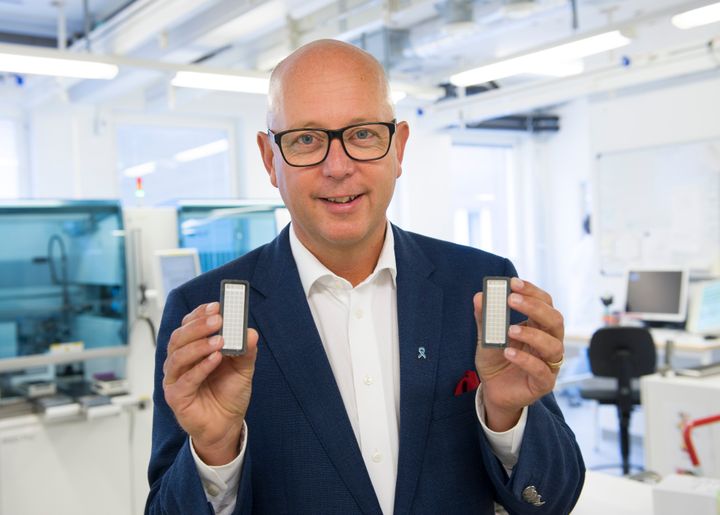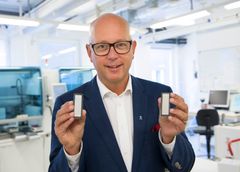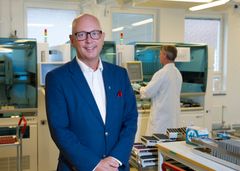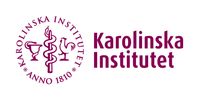New test for prostate cancer significantly improves prostate cancer screening
A study from Karolinska Institutet in Sweden shows that a new test for prostate cancer is better at detecting aggressive cancer than PSA. The new test, which has undergone trial in 58,818 men, discovers aggressive cancer earlier and reduces the number of false positive tests and unnecessary biopsies. The results are published in the scientific journal The Lancet Oncology.

Prostate cancer is the second most common cancer among men worldwide, with over 1.2 million diagnosed in 2012. In number of men diagnosed with prostate cancer increases and within 20 years over 2 million men are estimated to be diagnosed yearly. Currently, PSA is used to diagnose prostate cancer, but the procedure has long been controversial.
”PSA can't distinguish between aggressive and benign cancer,” says principal investigator Henrik Grönberg, MD, PhD, Professor of Cancer Epidemiology at Karolinska Institutet. ”Today, men who don't have cancer or who have a form of cancer that doesn't need treating must go through an unnecessary, painful and sometimes dangerous course of treatment. On top of this, PSA misses many aggressive cancers. We therefore decided to develop a more precise test that could potentially replace PSA.” The new so-called STHLM3 test is a blood test that analyzes a combination of six protein markers, over 200 genetic markers and clinical data (age, family history and previous prostate biopsies). The test has been developed by researchers at Karolinska Institutet in collaboration with Thermo Fisher Scientific, which provided the protein and genetic marker assays used in the clinical study. The study, which is presented in The Lancet Oncology, included 58,818 men from Stockholm aged 50 to 69 and was conducted between 2012 and 2014. The STHLM3 test and PSA were performed on all participants and then compared. The results show that the STHLM3 test reduced the number of biopsies by 30 percent without compromising patient safety. In addition, the STHLM3 test found aggressive cancers in men with low PSA values (1-3 ng/ml) - cancers that are currently going undetected. ”This is indeed promising results. If we can introduce a more accurate way of testing for prostate cancer, we'll spare patients unnecessary suffering and save resources for society”, says Professor Grönberg. ”The STHLM3 tests will be available in Sweden in March 2016 and we will now start validating it in other countries and ethnic groups”. The study was financed by the Stockholm County Council. Professor Grönberg is a researcher at the Department of Medical Epidemiology and Biostatistics at Karolinska Institutet.
Publication: 'Prostate cancer screening in men 50-69 years (STHLM3): a prospective population-based diagnostic study', Henrik Grönberg, Jan Adolfsson, Markus Aly, Tobias Nordström, Peter Wiklund, Yvonne Brandberg, James Thompson, Fredrik Wiklund, Johan Lindberg, Mark Clements, Lars Egevad & Martin Eklund, The Lancet Oncology, online November 9, 2015, http://dx.doi.org/10.1016/S1470-2045(15)00361-7.
Contacts
For further information, please contact:
Professor Henrik Grönberg, MD, PhD
Tel: +46 (0)70-3411356
Email: Henrik.gronberg@ki.se
To contact the Press Office and download images (http://ki.se/pressroom)
Images


Karolinska Institutet (http://ki.se/english) is one of the world's leading medical universities. Its vision is to significantly contribute to the improvement of human health. Karolinska Institutet accounts for over 40 per cent of the medical academic research conducted in Sweden and offers the country´s broadest range of education in medicine and health sciences. The Nobel Assembly at Karolinska Institutet selects the Nobel laureates in Physiology or Medicine.
Subscribe to releases from Karolinska Institutet - English
Subscribe to all the latest releases from Karolinska Institutet - English by registering your e-mail address below. You can unsubscribe at any time.
Latest releases from Karolinska Institutet - English
Fluoride in drinking water is associated with impaired childhood cognition7.3.2025 15:30:00 CET | Pressmeddelande
Elevated concentrations of fluoride can occur in well water, and in some countries, it is added to drinking water to counteract caries in the population. A study from Karolinska Institutet in Sweden now supports a few previous studies indicating that exposure to fluoride during the fetal stage or early childhood may impair cognition in children. The study is published in the journal Environmental Health Perspectives.
Children with ARFID face increased risk of disease17.2.2025 17:00:00 CET | Pressmeddelande
Children with avoidant restrictive food intake disorder (ARFID) have an elevated risk of developing psychiatric and physical conditions, a new study from Karolinska Institutet published in JAMA Pediatrics reports. The study highlights the importance of early identification to improve care of these children.
Preterm babies receive insufficient pain management27.1.2025 15:29:17 CET | Pressmeddelande
A large proportion of babies born very early need intensive care, which can be painful. But the healthcare system fails to provide pain relief to the full extent. This is shown by the largest survey to date of pain in neonatal care, now published in the journal Pain.
New study paves way for immunotherapies tailored for childhood cancers20.1.2025 17:00:00 CET | Pressmeddelande
Researchers at Karolinska Institutet and the Astrid Lindgren Children’s Hospital in Sweden have determined how children’s immune systems react to different kinds of cancer depending on their age. The study, which is published in the journal Cell, reveals significant differences between the immune response of children and adults, and has the potential to lead to new tailored treatments for children with cancer.
AI can improve ovarian cancer diagnoses2.1.2025 11:00:00 CET | Pressmeddelande
A new international study led by researchers at Karolinska Institutet in Sweden shows that AI-based models can outperform human experts at identifying ovarian cancer in ultrasound images. The study is published in Nature Medicine.
In our pressroom you can read all our latest releases, find our press contacts, images, documents and other relevant information about us.
Visit our pressroom